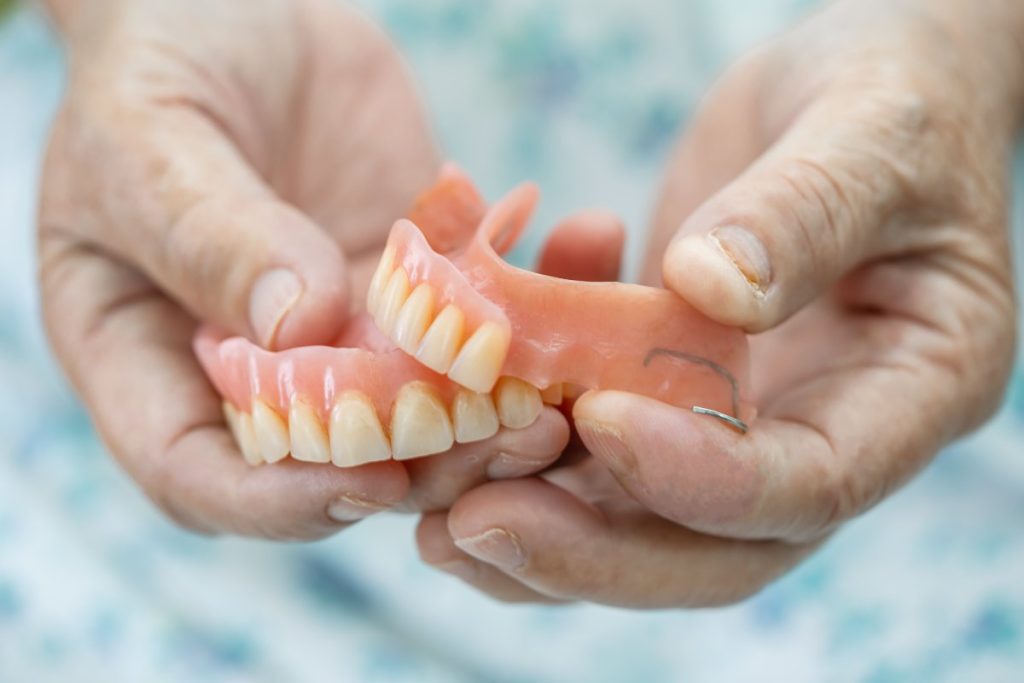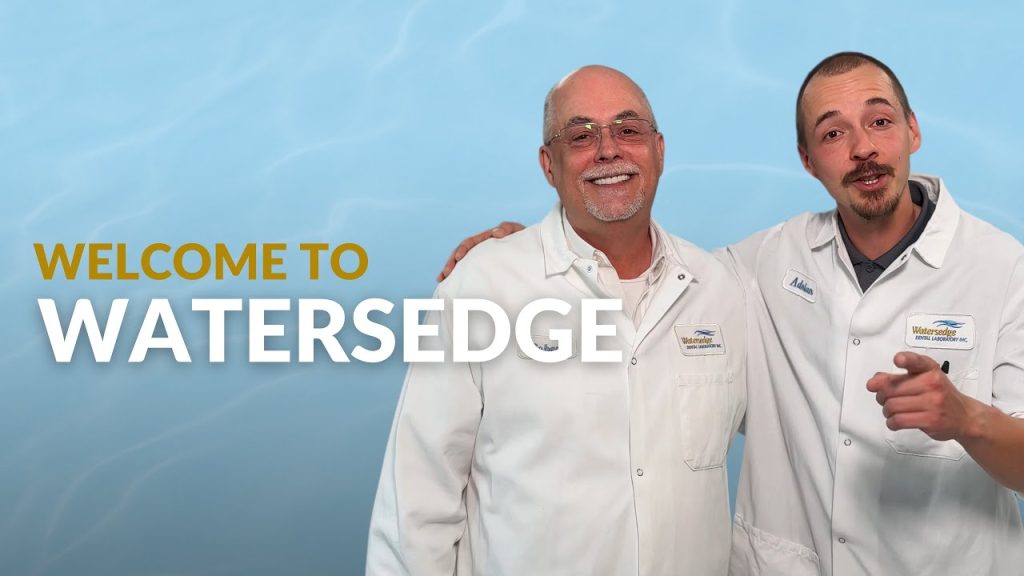
Selecting the right material for removable partial dentures (RPDs) directly affects patient comfort, function, and long-term oral health.
Chrome cobalt has long been the standard for cast partial denture frameworks, mainly due to its compatibility with traditional casting methods. Yet, advances in digital denture dentistry, particularly computer-aided design and manufacturing (CAD/CAM) software, as well as precision milling, have transformed how frameworks are fabricated. As a result, titanium has emerged as a strong alternative for cast partial dentures.
A clear understanding of the properties and clinical implications of both chrome cobalt and titanium allows dental professionals to deliver better patient care and achieve more predictable outcomes.
Table Of Contents:
- What is Chrome Cobalt?
- What is Titanium?
- Ethical Considerations of Material Choice
- Titanium vs. Chrome Cobalt Partial Dentures
- Titanium for Enhanced Patient Outcomes
- Working with Watersedge Dental Laboratory
What is Chrome Cobalt?
Chrome cobalt (CoCr) is a widely used dental alloy and has long been the standard for cast partial denture frameworks, primarily due to its compatibility with traditional casting techniques.
Historically, it’s been valued for its availability, cost-effectiveness, and strength. However, its rigidity and flexural strength can pose limitations for components that are subject to repeated flexing, such as clasps. Additionally, porosity (tiny internal air pockets not visible on the surface) can occur in chrome cobalt frameworks. While considered biocompatible, chrome cobalt does not reach the same level of biocompatibility as titanium.
Chrome cobalt is generally considered easy to trim and polish and remains a popular material in dentistry. Even so, it’s important to acknowledge there are ethical concerns associated with cobalt sourcing, discussed in more detail below.
What is Titanium?
Titanium (Ti) is a core material used in modern dentistry and has become a preferred material for cast partial denture frameworks.
It is valued for its exceptional biocompatibility, with few allergic or galvanic reactions and no associated metallic taste. Titanium is also lightweight (approximately 40% less than chrome cobalt), which enhances comfort in larger frameworks. Its high flexural strength also makes it ideal for components such as clasps.
Rather than being cast, titanium alloy frameworks are milled from a solid puck, eliminating porosity concerns. Although titanium is more challenging to trim and polish than chrome cobalt, at Watersedge Dental Laboratory, we use specialized techniques and tools, such as laser welders, to ensure the highest quality finish.
The initial cost of titanium is moderately higher than that of chrome cobalt. Still, it offers numerous benefits that justify the investment, particularly in cases where comfort, strength, and biocompatibility are top priorities. Additionally, Titanium sourcing does not present the ethical concerns associated with cobalt mining.
Ethical Considerations of Material Choice
The material choice for removable partial dentures extends beyond mechanical properties and biocompatibility; it also raises important ethical questions.
The mining of cobalt, a key component of chrome cobalt alloys, presents significant concerns regarding environmental and human impacts.
The extraction of cobalt (where over 50% of the world’s cobalt originates and approximately 70% of the mining takes place) is associated with toxic contamination of land and water, loss of biodiversity, and hazardous conditions for workers. Documented risks include exposure to toxic dust, increased rates of congenital anomalies, and exploitative labour practices such as child labour and forced work.
While chrome cobalt continues to play an important role in dentistry, understanding these broader concerns is an essential part of making informed, responsible material choices. Titanium is an alternative that avoids these ethical challenges.
[Get Started with Watersedge Dental Lab]
Comparison: Titanium vs. Chrome Cobalt Partial Dentures

To help dental professionals compare how each material impacts patient experience and prosthetic performance, we’ve summarized the key properties and clinical considerations of chrome cobalt and titanium below:
| Titanium | Chrome Cobalt | |
| Ease of Fabrication | Fabrication is performed by milling from a solid titanium puck using advanced CAD/CAM technology. Not easily castable. | Easy to cast into moulds using conventional techniques. |
| Biocompatibility | Superior biocompatibility. Patients exhibit lower reactivity and fewer allergic responses compared to chrome cobalt. | Biocompatible; however, less biocompatible than titanium. |
| Strength & Flexibility | Strong with higher flexural strength. Clasps are more resilient and can withstand repeated flexing. | Strong and rigid, with lower flexural strength. More prone to clasp fracture if bent repeatedly due to rigidity. |
| Weight | Lighter weight. ~40% lighter than chrome cobalt. Enhances patient comfort, particularly in complex cases. | Heavier. ~40% heavier than titanium. Weight is noticeable in complex cases involving features such as metal onlays or high metal linguals. |
| Porosity | Porosity-free. Milled titanium is fabricated from a solid puck. | Cast chrome cobalt frames may be porous. Note: SLM printing (selective laser melting) fuses fine chrome cobalt layers to create porosity-free frameworks, a process Watersedge incorporates in chrome cobalt cases. |
| Longevity | Long lifespan. Increased flexural strength may contribute to slightly longer clasp longevity. | Long lifespan. |
| Appearance | Standard metal appearance. Also offers anodization options (to alter the colour of the appliance) through the application of an electrical current. | Standard metal appearance. |
| Galvanic Reaction | No risk of galvanic reactions. | Rare risk of galvanic reaction (electrical current sensation) near dissimilar metals. |
| Metallic Taste | Not associated with metallic taste. | Some patients may experience a metallic taste. May be impacted by factors such as saliva acidity, oral hygiene, hydration, or diet. |
| Ease of Finishing | More technically demanding to finish. Watersedge Dental Laboratory utilizes specialized tools and techniques to adjust and polish titanium. | Easy to trim and polish. |
| Weldability | Not necessarily easy to weld; requires specific equipment like a laser welder that not all labs are equipped for. (Note: Watersedge is equipped to laser weld titanium.) | Generally easier to weld. |
| Ethical Considerations | Recognized as the ethical choice. Titanium sourcing is not linked to environmental or human rights concerns. | Ethical concerns. Cobalt is mined in regions without strict regulations and is linked to environmental harm and worker hazards. |
| Cost | Higher initial material cost. Moderate price impact when viewed within the total case cost. | Lower material cost; commonly considered cost-efficient. |
Titanium for Enhanced Patient Outcomes
When balancing clinical needs with patient comfort and durability, titanium offers significant advantages and is often considered the ideal material for cast partial dentures.
Reducing Patient Sensitivities
Titanium provides superior biocompatibility. Patients with known metal allergies typically experience less reactivity with titanium as compared to non-precious alloys such as chrome cobalt. Even highly sensitive patients requiring dental implants generally tolerate titanium well, further reinforcing its reputation as a material of choice in complex clinical cases.
Titanium also significantly reduces the risk of galvanic reaction, a rare but uncomfortable phenomenon where dissimilar metals in the mouth can create an electrical current-like sensation or pain. Additionally, some patients may experience a metallic taste with chrome cobalt, which can be influenced by factors such as saliva acidity, oral hygiene, and diet. Titanium is not associated with metallic taste, making it a preferred material for patients who are prone to such sensitivities.
Enhancing Patient Comfort
In addition to titanium’s biocompatibility, its lighter weight (approximately 40% lighter than chrome cobalt) can make a meaningful difference in long-term comfort and influence overall acceptance of the prosthesis. As a solution to replace missing teeth, titanium denture frameworks are favoured for their ability to minimize bulk and improve patient comfort.
Complex Partial Denture Designs
Titanium’s weight advantage is significant when substantial metal coverage is required. Cases incorporating metal onlays or high metal linguals to restore vertical space or reinforce areas with limited clearance can result in noticeably heavier appliances when fabricated from chrome cobalt.
Working with Watersedge Dental Laboratory

At Watersedge, we have extensive experience working with both chrome cobalt and titanium to fabricate cast removable partial dentures. This capability allows us to offer clinicians flexible options and provide comprehensive support for any case.
Technical Ability and Experience
Our team brings deep expertise in handling both materials. We are highly skilled in the techniques required to adjust and polish any removable partial denture framework precisely, ensuring optimal results. While some perceive titanium as more difficult to work with, it is not a concern at Watersedge, as we have the tools and experience needed to deliver consistently high-quality outcomes.
Advanced Technology and Fabrication Methods
Our investment in digital dentistry and advanced technology supports every stage of fabrication and finishing. We utilize CAD/CAM software for precise digital designs and have the necessary tools to perform proper adjustments and polishing of titanium and chrome cobalt frameworks. This level of precision results in a better fit, function, and overall experience for your patients.
Fabrication Process and Quality Control
At Watersedge, our approach is tailored to specific requirements, as each material requires distinct processes. We digitally design chrome cobalt cases, which are then either SLM printed or outsourced to trusted dental labs with dedicated facilities for casting. In contrast, titanium is milled from a large, solid block or “puck.” Regardless of whether a framework is cast chrome cobalt, SLM printed, or milled titanium, Watersedge maintains control over the digital design and the final stages of adjustment and finishing. This integrated approach ensures that every framework we deliver meets our standards for accuracy, quality, and predictability.
Collaboration and Clinical Support
We aim to provide clinicians with a smooth, predictable process that benefits patients. Our team prioritizes open collaboration and is always available to discuss materials and treatment planning.
If you have any questions about material properties, including weight, strength, or cost, don’t hesitate to reach out to Watersedge.
Request a Partial Dental Framework from Watersedge
It is easy to request a removable partial denture framework from Wateresedge.
- Provide Patient Records
Submit the essential patient records required for a cast partial case. This typically includes accurate final impressions or digital scans of the upper and lower arches. We accept both traditional impressions and models, as well as digital files from intraoral scanners, allowing you to use your preferred method. Please also include a bite registration.
- Specify the Material on the Prescription
Clearly indicate your material preference when submitting the case. Request either titanium or chrome cobalt on the prescription. Based on your specifications and the provided records, we will proceed with the design and fabrication process.
- Considerations for Complex Cases
While most cases follow a straightforward process, more complex cases may involve additional steps, such as creating a custom tray or a diagnostic setup. If needed, we will communicate this during the case planning phase.
Note: Stainless steel is not used as a fabrication material for partial dentures at Watersedge.
Get Started with Watersedge
Watersedge Dental Laboratory offers extensive expertise in both chrome cobalt and titanium partial frameworks. We provide flexible solutions, expert guidance, and a streamlined process to our clinical partners, allowing you to provide high-quality care.
If you have a case ready to submit or questions about selecting the best material for your next partial denture, contact us today.
[Submit a Case to Watersedge Dental Laboratory]
